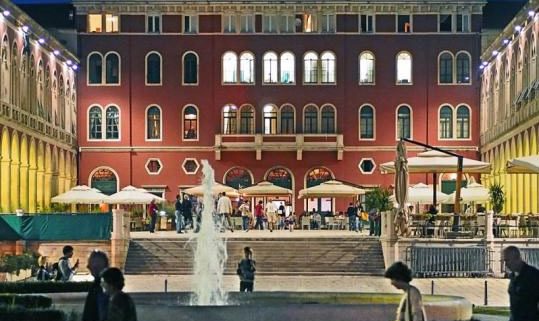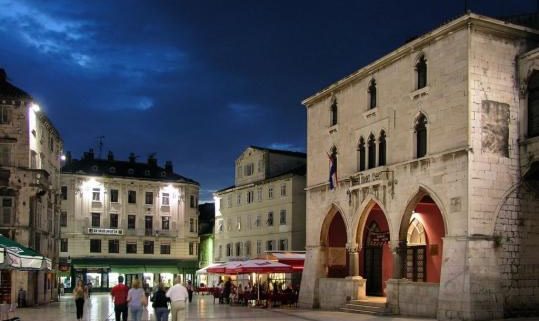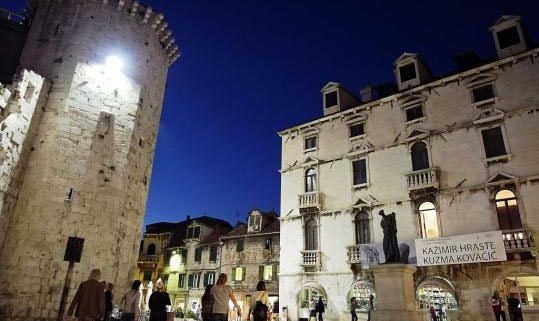Piazze

Prokurative
Prokurative o, ufficialmente, la Piazza della Repubblica è una grande piazza situata a ovest della Riva. Simile alla Piazza di San Marco a Venezia, da tre lati è chiusa da palazzi neorinascimentali con portici ai quali deve appunto il suo nome di Prokurative, comunemente usato. La piazza è aperta solamente verso sud, offrendo una bellissima vista sul porto e sulla Riva.
La costruzione della piazza fu iniziata nel XIX secolo da Antonio Bajamonti, uno dei più importanti e noti sindaci nella storia della città, che voleva mostrare che Spalato era completamente appoggiata alle tradizioni italiane. Lo dimostrano arcate come quelle veneziane, o rilievi sopra le finestre che riflettono influenza dell’antichità e del rinascimento. Il grande teatro che Bajamonti fece costruire in piazza fu distrutto da un incendio. La piazza è da tempo riconosciuta come un palcoscenico adatto a diversi eventi culturali, quali festival di musica leggera, e grazie a numerosi bar e ristoranti è diventata uno dei ritrovi preferiti dei cittadini. La parte integrante della piazza è anche il largo, che si trova al lato meridionale, che fino al 1947 ospitava una monumentale fontana in stile neoclassico, rasa al suolo dalle autorità comuniste che la identificavano con l’occupazione miltare italiana di Spalato e della Dalmazia.


Pjaca
La Piazza del Popolo, o semplicemente Pjaca, è un’altra piazza che a Spalato nessuno chiama con il suo vero nome. Menzionata per la prima volta nel XIII secolo come lo Spiazzo di San Lorenzo, è la prima parte abitata di Spalato fuori il Palazzo di Diocleziano, al cui muro occidentale è appoggiata. Da secoli Pjaca rappresenta il centro della vita cittadina: le autorità cittadine risiedevano nel palazzo gotico del municipio che oggi ospita uno spazio di esposizione, nei bellissimi e ancor oggi ben conservati palazzi circostanti vivevano le famiglie patrizie dei Cambj, Pavlović, Nakić, Ciprianis, Karepić… In Pjaca si trova ed è ancora aperta una delle prime librerie, Libreria Morpurgo, che anche oggi appare quasi come nel 1861. Gli intellettuali spalatini si incontravano nel caffè Central, situato nell’ex hotel Troccoli che, rappresenta gli inizi del turismo a Spalato. Da secoli in Pjaca sorge la torre con l’orologio cittadino, singolare per il suo quadrante con 24 numeri romani. Nei caffè, ristoranti e bar che circondano la piazza gli spalatini sempre trovavano luogo dove riposare, incontrare, vedere o essere visti. Ogni palazzo della Pjaca ha la sua storia ed è testimone della storia e mentalità cittadina. Come nel passato, anche oggi la Pjaca invita ai suoi bar, ristoranti e negozi, non solo la gente locale, bensì anche numerosi turisti che vogliono sentire l’autentica anima della città e goderne insieme agli spalatini, i loro ospitanti.


La Piazza della Frutta
Che ci crediate o no, anche questa piazza, forse la più bella della città, tra gli spalatini è più nota per il suo nome non ufficiale che per quell’ufficiale – Piazza dei Fratelli Radić. Il suo nome popolare lo deve al fatto che nel passato vi si trovava un rumoroso e pittoresco mercato dove le contadine dei paesi vicini vendevano la frutta. In piazza adiacente, a ovest, si vendeva la verdura.
Anche se non è molto gChe ci crediate o no, anche questa piazza, forse la più bella della città, tra gli spalatini è più nota per il suo nome non ufChe ci crediate o no, anche questa piazza, forse la più bella della città, tra gli spalatini è più nota per il suo nome non ufficiale che per quell’ufficiale – Piazza dei Fratelli Radić. Il suo nome popolare lo deve al fatto che nel passato vi si trovava un rumoroso e pittoresco mercato dove le contadine dei paesi vicini vendevano la frutficiale che per quell’ufficiale – Piazza dei Fratelli Radić. Il suo nome popolare lo deve al fatto che nel passato vi si trovava un rumoroso e pittoresco mercato dove le contadine dei paesi vicini vendevano la frutrande, la Piazza della Frutta è sempra traboccante di vita nei suoi bar, ristoranti o negozi esclusivi ed è posto ideale per diverse piccole fiere. Vi si trovano monumenti di gran importanza per la storia della città. Nell’angolo sud occidentale sorge una grande torre a pianta ottagonale di origine veneziana, rimasta delle fortificazioni costruite nel XV secolo per la difesa dell’allora piccola città. Di fronte ad essa, il bellissimo Palazzo Milesi risalente al XVII secolo, la cui facciata è uno dei capolavori dell’architettura barocca in Dalmazia. In centro della piazza è situata la statua di Marko Marulić, padre della letteratura croata, uno dei più eminenti umanisti e intellettuali del ‘400. La statua è opera di Ivan Meštrović, autore di diversi altri monumenti in città. La storia della Piazza della Frutta certamente non finsce qui. Ogni sua pietra, così come nelle altre piazze della città, è testimone dei suoi tempi, fino all’epoca più antica, rappresentata dalla torre sud occidentale del Palazzo di Diocleziano, che troviamo uscendo dalla pizza verso il mare. Per tutto questo, la Piazza della Frutta, insieme alla Pjaca, occupa un posto speciale nel cuore degli spalatini e non sorprende che abbia avuto il ruolo centrale in una delle più popolari serie della talevisione croata, una saga della città di Spalato chiamata “Velo Misto” (“Il Grande Paese”).


 Italiano
Italiano Hrvatski
Hrvatski English
English Deutsch
Deutsch



